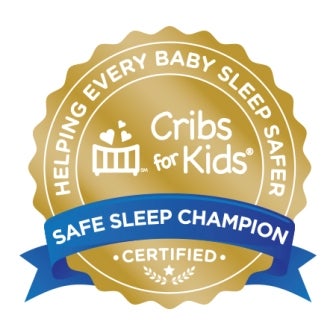Ascension St. Vincent’s helps families keep babies safe during sleep

In Jacksonville, Florida, expecting families learn ways to prevent infant sleep-related deaths at Ascension St. Vincent’s
Ascension St. Vincent’s Family Birth Places-Southside and Ascension St. Vincent's Clay County - Birthing Center in Northeast Florida is certified by Cribs for Kids National Safe Sleep Hospital Certification Program. With training and a commitment to patient and community education, St. Vincent’s helps families keep their babies safe during sleep.
Your baby’s growth and development are tied to consistent and safe sleep. Even putting your baby down for a nap with a headband is risky. It can slip down over the baby’s mouth or onto the neck and cause problems. While the circumstances may sound odd that such a basic human need can be so threatening, the truth is sleep-related deaths are a large portion of all child fatalities in Florida.
Both of St. Vincent’s Family Birth Places in northeast Florida are certified by Cribs for Kids as National Infant Safe Sleep Hospitals. With training and a commitment to patient and community education, St. Vincent’s is seeing the positive impact.
Educating about Safe Sleep Environments
“Florida and Texas have two of the highest rates of sleep-related deaths in the country. It’s an alarming stat, but these are preventable deaths,” says Athea Whitehead, Family Birth Place system director. “One of the things we’ve found across all cases is the baby was not sleeping in a safe environment. The temperature is too high, stuffed animals and pillows crowd the baby’s bed, they’re wearing headbands or other unnecessary items. These were the things we had to educate our new mothers about.” Birth Place educators started the education process with doctors, nurses and office staff who interact with new mothers. The nurses take the lead on educating mothers, fathers, and any caregiver who would tend to the newborn.Steps to Safe Sleep
- Look at your baby’s sleep environment and remove items that could cause suffocation.
- Always put the infant to sleep on his or her back.
- Older children and adults should not fall asleep with the infant in a bed or couch. The baby could be crushed.
- Check cribs, so moving parts are secure, and rails are in place, so the baby avoids rolling out of bed.
If the baby is awake, tummy time is encouraged, but newborns should never sleep on their stomach. The baby’s bed should be kept free of all clutter, including excessive large blankets and quilts that could smother the baby.
Swaddling the baby is best and helps your baby feel secure. At our Family Birth Place, every parent who delivers here gets a sleep sack as a gift. The sleep sack wraps the baby up snugly and zips shut, functioning as a sort of sleeping bag for infants.
Continued Commitment to Safe Sleep
Becoming a Safe Sleep certified hospital means our birthing care teams create educational programming for expecting families. St. Vincent’s Family Birth Places - Southside and Ascension St. Vincent's Clay County - Birthing Center is recognized as a “Gold” Safe Sleep certified by Cribs for Kids for providing the highest level of care to families on infant sleep education. St. Vincent’s is the first health system in Northeast Florida to achieve gold certification.
Attaining certification was a daunting year-long effort and now both of St. Vincent’s Family Birth Place units are “Gold” Safe Sleep certified by Cribs for Kids -- the highest level. St. Vincent’s is the first health system in Northeast Florida to achieve gold certification.
Our goal is to aim for the gold regardless of our certification level. We use this opportunity to give back to our community by teaching new parents how to better care for their babies. If we can prevent just one sleep-related fatality with the education we’re providing, we’ll be proud of the impact that we’ve made.

Clay County 904-602-2229
Riverside 904-308-6359
Southside 904-296-5212
Keep your infant safe during sleep at home
As a certified Safe Sleep center, our care teams follow guidelines set by the American Academy of Pediatrics for safe sleep. We provide education and guidance to parents and caregivers on safe sleep practices. To ensure your baby sleeps safely, follow the ABCs of safe sleep:
- Alone: Share your room, not your bed. Your baby should not sleep with others in a bed, on a couch, or in a chair.
- Back: Your baby should sleep on his or her back in a safety-approved crib on a firm mattress during naps and at nighttime.
- Crib: The crib should be empty. Remove all loose bedding, comforters, quilts, stuffed animals, bumpers, wedges, and pillows from your baby's crib.
Ascension St. Vincent’s birthing center care teams also suggest that if your baby is awake, tummy time is encouraged, but newborns should never sleep on their stomach. Swaddling the baby is best and helps your baby feel secure. At our Family Birth Place, every parent who delivers here gets a sleep sack as a gift. The sleep sack wraps the baby and functions as a sleeping bag for infants.
Last updated: March 19, 2025